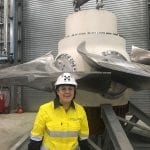Around The Web
Women in hydro, and why more are needed: “Women and men don’t think the same way”
 Following CEC's Women in Renewables Leaders’ Pledge, we spoke with the women who’ve done a lot of work in hydro this year.
Following CEC's Women in Renewables Leaders’ Pledge, we spoke with the women who’ve done a lot of work in hydro this year.
The post Women in hydro, and why more are needed: “Women and men don’t think the same way” appeared first on RenewEconomy.
CP Daily: Wednesday September 19, 2018
Shark attack in Whitsundays leaves woman, 46, critical
Doctor on nearby boat stopped bleeding before tourist airlifted to Mackay
A Tasmanian tourist bitten by a shark in the Whitsunday Islands of north Queensland has been saved by the actions of an emergency department doctor.
Dr John Hadok from Mackay base hospital was on a nearby boat when the 46-year-old woman was attacked while swimming at Cid Harbour off Whitsunday Island about 5pm on Wednesday.
Continue reading...We've cracked the cane toad genome, and that could help put the brakes on its invasion
EU Market: EUAs jump 6% to above €21 after failed auction
NYISO carbon charge would result in few cost increases through 2030, study finds
US moves to throttle methane regulations on public lands
Mexico announces 2022 start to its emissions trading scheme
Business lobby wary of backing a deeper 2030 EU emission goal
Crucial antibiotics still used on US farms despite public health fears
Tests at meat packing plants show no reduction in drugs, a year after new rules to clamp down on overuse
Antibiotics crucial to human medicine are still being used in “unacceptable” quantities on US livestock farms, despite rules brought in last year to curb their use and combat the spread of deadly superbugs.
Tests on thousands of meat samples by the US Food Safety and Inspection Service (FSIS) show that powerful antibiotics classified as “critically important” to human health are still being used. The widespread use of such drugs on livestock is one of the key drivers of antibiotic resistance, a growing public health crisis.
Continue reading...Shell and Exxon's secret 1980s climate change warnings | Benjamin Franta
Newly found documents from the 1980s show that fossil fuel companies privately predicted the global damage that would be caused by their products.
One day in 1961, an American economist named Daniel Ellsberg stumbled across a piece of paper with apocalyptic implications. Ellsberg, who was advising the US government on its secret nuclear war plans, had discovered a document that contained an official estimate of the death toll in a preemptive “first strike” on China and the Soviet Union: 300 million in those countries, and double that globally.
Ellsberg was troubled that such a plan existed; years later, he tried to leak the details of nuclear annihilation to the public. Although his attempt failed, Ellsberg would become famous instead for leaking what came to be known as the Pentagon Papers – the US government’s secret history of its military intervention in Vietnam.
Continue reading...UPDATE – UK auction fails for third time this year on weak demand
Electric Kombi will create a buzz for VW fans, due in 2022
 Iconic VW Kombi made popular in the 70s by hippies and travelers is getting a makeover and being reborn as the all-electric I.D. Buzz.
Iconic VW Kombi made popular in the 70s by hippies and travelers is getting a makeover and being reborn as the all-electric I.D. Buzz.
The post Electric Kombi will create a buzz for VW fans, due in 2022 appeared first on RenewEconomy.
Bipartisan inquiry recommends Australia ban domestic ivory trade
Senator who kicked off inquiry says Australia contributes to rhinoceros and elephant poaching by providing a market
A bipartisan parliamentary committee has recommended a national ban on the domestic trade of elephant ivory and rhino horn.
Australia’s environment minister, Melissa Price, is considering the recommendations from a Senate inquiry examining the trade before she attends an international wildlife trade conference in London next month.
Continue reading...Audi unveils its e-tron electric SUV, and it’s coming to Australia
 Audi unveils the e-tron, the all-electric SUV that signals the start of the German auto brands shift to battery powered vehicles.
Audi unveils the e-tron, the all-electric SUV that signals the start of the German auto brands shift to battery powered vehicles.
The post Audi unveils its e-tron electric SUV, and it’s coming to Australia appeared first on RenewEconomy.
Long hot summer means we should enjoy spectacular autumn colour
Plenty of sunshine is needed to bring out the intense reds and yellows from the leaves, and this year we’re set for a dazzling display
Autumn colour is perhaps the most striking of nature’s seasonal displays, but the vividness of the annual spectacle is largely dependent on good environmental conditions. This year, following a fine summer and with an Indian summer predicted, we look to be on course for a dazzling display that could trump recent years and extend well into November.
Shorter daylight hours and colder nights are what trigger leaf drop – or senescence – but frost, like rain, can damage leaves and cause early leaf fall. Plenty of sunshine is needed to encourage concentrations of colour pigments which help to intensify leaf colour.
Continue reading...Chris Packham launches People's Manifesto for Wildlife
Initiative lays out practical steps we can all take to help halt destruction of species and habitats in Britain
Replanting hedgerows, including birdboxes on all new-build homes, rewilding uplands and an end to seal culling: these are among demands of the People’s Manifesto for Wildlife, a new initiative aimed at halting the drastic decline in British wildlife.
The manifesto has been drawn up by the naturalist and broadcaster Chris Packham, with the aid of 17 independent experts and scientists. They warned that people are sleepwalking into an “ecological apocalypse”, but said everyone could take practical steps themselves, and campaign for broader measures that could yet avert the wholesale destruction of species and habitats.
Continue reading...Microplastics can spread via flying insects, research shows
‘Shocking’ study reveals plastic contaminates our skies as well as the oceans, say scientists
Microplastic can escape from polluted waters via flying insects, new research has revealed, contaminating new environments and threatening birds and other creatures that eat the insects.
Scientists fed microplastics to mosquito larvae, which live in water, but found that the particles remained inside the animals as they transformed into flying adults. Other recent research found that half of the mayfly and caddisfly larvae in rivers in Wales contained microplastics.
Continue reading...Large blue butterfly enjoys best UK summer on record
Hot weather and conservation drive help once-extinct insect make dramatic comeback
A previously extinct butterfly, the large blue, has enjoyed its best UK summer on record thanks to the lovely weather and a determined conservation effort on hills in the West Country of England.
The large blue, a popular specimen among Victorian collectors, was declared extinct in Britain in the 1970s but has since made a dramatic comeback.
Continue reading...Great Barrier Reef Marine Park Authority board director accused of potential conflict of interest
Documents show Margie McKenzie failed to declare her interest in Gempearl for her first two years on board
A board director for the Great Barrier Reef Marine Park Authority has been accused of a potential conflict of interest over public funding directed to companies working on crown-of-thorns starfish culling.
Margie McKenzie sits on the board of the authority and also owns a company called Gempearl with her husband, Col McKenzie.
Continue reading...


